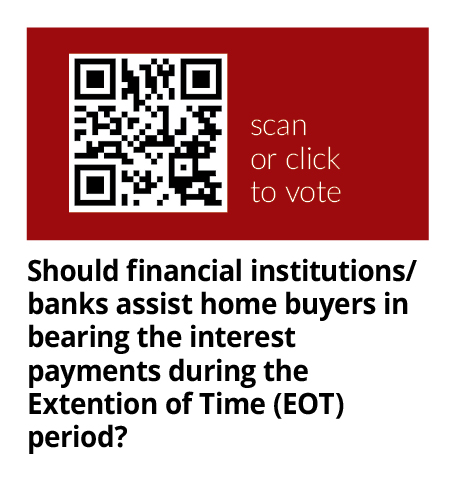By Joseph Wong
Property buyers in Malaysia often look forward to the completion of their dream homes. However, the issue of Extension of Time (EOT) has been a thorny one for many buyers, leaving them feeling unfairly treated. One of the primary concerns for property buyers is the delayed possession of their homes and when the government allows for an EOT, it is always seen negatively from the perspective of the buyer.
For the property developer, an EOT is a lifeline as it extends the delivery timeline. But buyers, who have often meticulously planned their move-in dates, find themselves in limbo, causing inconvenience and additional expenses, such as rental costs or temporary accommodation. And if they are renting, it is usually over a fixed period of six months to a one-year period, and if the vacant possession happens to be extended due to the EOT, for example, those who have rented their current homes will have to also extend the tenancy agreement.
Some landlords are understanding and allow their tenants to extend to the period needed for vacant possession. Others might already have the next tenants on standby to take over the tenancy and are unable to extend the tenancy for the existing tenants. In such cases, the affected would not only have to move twice if they can find a suitable temporary home but they would have to deal with the additional rent as well as the interest instalment payments to the banks.
While most people believe that the EOT normally affects the buyer and the developer, there is an overlooked third party who continues to benefit regardless of the duration of the extension: The Banks.
But these financial institutions have always been left out of the EOT loop, leaving it to the buyers to bear the full brunt of the consequences. Many buyers have voiced that it is easy for the government to give the EOT when they do not feel the financial implication that comes along with it.
There is another possible solution to overburdening home buyers, especially those of the lower income groups. Instead of penalising just the buyers, it is suggested that some of the burden be borne by the financial institutions either by not charging or reducing the interest paid during the EOT period.
Financial institutions’ involvement
Such questions were first raised after the implementation of the initial moratorium on home loans during the movement control order as a result of the Covid-19 pandemic in 2020. As a result of the moratorium to delay the loan repayment by six months, the repayment schedule was lengthened to include interest that was not received by banks. In addition, the additional interest charged on the deferred instalments was borne by borrowers.
Similarly, with EOT, the additional charges are borne by borrowers while banks gain additional revenue due to the delayed repayment. To ease the burden of the buyers, this question has been raised: Should the banks and financial institutions also bear a part of this burden?
While banks also underwent difficulties during the MCO, they remain profitable. In fact, as share prices go, most of the bank and financial institutions share prices are on the rise and their revenue and profits remain high.
One developer joked: "We are all working for the banks." Viewed from a different perspective, that appears to be a valid observation. Given that banks and financial institutions profit from home buyers, should they not also be considered during the EOT process? While it is true they may earn less interest, shouldn't the government prioritise the welfare of genuine home buyers as well?
No compensation
During the extended period, buyers have to continue servicing their housing loans without enjoying the benefits of home ownership. This situation creates a financial burden as they are essentially paying for a property they cannot yet occupy over an extended period. This is why Liquidated Ascertained Damages (LAD) are usually paid to the affected buyers. With the EOT, there is no such compensation. Buyers are left to bear the financial burden of extended rental costs and loan repayments. Developers, on the other hand, may not face adequate penalties for delays, which can be perceived as an unfair advantage.
The longer the EOT is given, the worse off the buyer. When the EOT is granted without clear timelines for completion. buyers are left in the dark about when they can finally take possession of their homes, making it challenging to plan their lives effectively. This uncertainty can lead to frustration and anxiety. The stress and emotional toll of delayed possession should not be underestimated. Homebuyers invest not only their finances but also their emotions in the process. Extended waiting periods can take a toll on their well-being.
Moreover, delayed possession can also impact the resale value of properties. Buyers who had initially planned to sell or rent out their units may find it challenging to do so when the property is delivered later than expected. This delay can affect their investment plans.
Lack of transparency
A lack of transparency in the granting of EOT is another concern. The information on how many EOT were granted by the government post Covid-19 is vague and there is no proper breakdown or whether the EOT were given further EOT. Shouldn't the buyers, as stakeholders, be informed on this?
In addition to buyers not being informed promptly about the reasons for delays or the status of their projects, this lack of transparency can lead to frustration and mistrust.
The EOT certainly erodes trust between buyers and property developers. Buyers may feel that developers are not held accountable for not meeting their commitments, which can damage the industry's reputation as a whole.
Legal Complexities
Seeking compensation or resolution for EOT-related issues can be legally complex and time-consuming. Many buyers are not fully aware of their rights and may lack the resources to pursue legal action against developers.
Property buyers often have limited bargaining power compared to developers, who hold more significant influence in the market. This power imbalance can lead to unequal negotiations and outcomes.
The issue of EOT in the Malaysian property market raises concerns about fairness and accountability. Buyers rightly expect timely possession of their properties after making substantial investments. Addressing these issues may require a more balanced approach, clear regulations and mechanisms to protect the interests of property buyers. Ultimately, achieving fairness in EOT situations is crucial to maintaining trust and confidence in the property market. Click on this link to vote.
What is LAD?
Liquidated Ascertained Damages, commonly referred to as LAD, refers to a genuine pre-estimate of the loss that one party will suffer in the event of a contract breach by the other.
LAD clauses are typically included in Sale and Purchase Agreements (SPAs), outlining the repercussions of delays in the agreement's fulfilment. For instance, if the handover of vacant possession (VP) by the vendor or developer is delayed, the purchaser may be entitled to claim LAD, commonly referred to as the LAD clause.
When purchasing a strata property from a property developer, the LAD clause can be found in clause 25 of the prescribed SPA under Schedule H, which states:
“25. (1) Vacant possession of the said Parcel shall be delivered to the Purchaser in the manner stipulated in clause 27 within thirty-six (36) months from the date of this Agreement. (2) If the Developer fails to deliver vacant possession of the said Parcel in the manner stipulated in clause 27 within the period stipulated in subclause (1), the Developer shall be liable to pay to the Purchaser liquidated damages calculated from day to day at the rate of ten per centum (10%) per annum of the purchase price from the expiry of the period stipulated in subclause (1) until the date the Purchaser takes vacant possession of the said Parcel.”
In essence, this entails that according to Schedule H, the developer is obligated to provide vacant possession of the property within 36 months from the SPA date.
Thus, if the buyer's SPA date was on Jan 1, 2018, the developer should have handed over vacant possession of the property to the buyer no later than Dec 31, 2020. Should the developer fail to meet this obligation, the calculation of LAD starts from Jan 1, 2021 until VP.
The buyer can claim a compensation of 10% per annum. A simplified version is this: A buyer was given VP to his RM300,000 home 150 days past the completion date. The LAD is calculated as RM300,000 times 10% times 150 days and divided by 365 days which equals RM12,328.76.
Stay ahead of the crowd and enjoy fresh insights on real estate, property development, and lifestyle trends when you subscribe to our newsletter and follow us on social media.













































